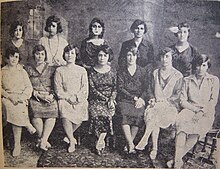You can help expand this article with text translated from the corresponding article in Persian. (January 2020) Click for important translation instructions.
|
| Mastoureh Afshar | |
|---|---|
 Mastoureh Afshar (Sitting from left, fourth person) in Jamiat Nesvan Vatankhah Mastoureh Afshar (Sitting from left, fourth person) in Jamiat Nesvan Vatankhah | |
| Born | 1898 Urmia, West Azerbaijan, Persia |
| Died | 1951 Tehran |
| Nationality | Iranian |
| Occupation(s) | Feminist and women's rights activist |
| Known for | Co-founder of the Patriotic Women's League of Iran |
Mastoureh Afshar (Persian: مستوره افشار; 1898–1951) was an Iranian intellectual, feminist, and a pioneering figure in the women's rights movement in Iran. Alongside contemporary feminists Mohtaram Eskandari and Noor-ol-Hoda Mangeneh, she co-founded the radicalist Patriotic Women's League of Iran in Tehran in 1922. She became the society's president in 1925 and held the position until 1932.
Early life
Mastoureh Afshar was born in 1898 in Urmia, West Azerbaijan. She was the daughter of Majd al Saltaneh Afshar, an intellectual Iranian nationalist. Afshar was educated in Russia and spoke Persian, Azeri, Turkish and French. She had four siblings; her eldest brother was Jalal Afshar Orami, the father of Iranian entomology. Her sister Turan Afshar was also an entomologist whereas her other two sisters Alca and Heide were active politically as members of the Patriotic Women's League alongside Mastoureh.
In the aftermath of the Persian Constitutional Revolution, multiple women's rights organizations came into existence. Afshar, alongside her contemporaries Sediqeh Dowlatabadi, Mohtaram Eskandari and others, advocated for the creation of girls schools and development of political rights for women. She co-founded the Patriotics Women's League in 1922 which was headed by Mohtaram Eskandari until 1925 after Eskandari died of spinal surgery complications at the age of 29. She assumed the leadership role until 1932. She attended the first conference on Muslim women held in Damascus in 1930, as part of the Iranian delegation alongside Sediqeh Dowlatabadi and Tabatai.
In 1932, she was invited by the Iranian government to organize and open the second Eastern Women's Congress in Tehran from November 27 to December 2 of the same year. The congress was attended by women from 15 countries ranging from Australia and Afghanistan to Zanzibar. The Congress passed a 22-point resolution which promoted women's suffrage, equal opportunities in education and work, the reformation of family law, and prohibition of polygamy and prostitution. However, after the Congress ended, the government took over the Patriotics Women's League and it ceased to exist.
Death
She remained unmarried and died in Tehran in 1951 of breast cancer.
See also
References
- Nafisi, Azar (2008). Things I've Been Silent About. Random House Publishing Group. p. 245. ISBN 978-1-58836-749-5. Retrieved 9 January 2020.
- Women and the political process in twentieth-century Iran. Cambridge University Press, 1997, ISBN 0-521-59572-X, ISBN 978-0-521-59572-8
- Mottaghi, Somayyeh. "The Historical Relationship between Women's Education and Women's Activism in Iran" (PDF). Asian Women. Retrieved 9 January 2020.
- "Mastura Afshar Orami, the first women's rights activist in Iran". Durna (in Persian). Archived from the original on 27 February 2018. Retrieved 10 January 2020.
- ^ Sedghi, Hamideh (2007). Women and Politics in Iran: Veiling, Unveiling, and Reveiling. Cambridge University Press. pp. 52, 82. ISBN 978-1-139-46372-0. Retrieved 9 January 2020.
- "PRE-REVOLUTION WOMEN MILESTONES". fis-iran.org. Foundation for Iranian Studies. Retrieved 9 January 2020.
- Maggs, Sam (2018). Girl Squads: 20 Female Friendships That Changed History. Quirk Books. ISBN 978-1-68369-073-3. Retrieved 9 January 2020.
- خراسانی, نوشین احمدی (14 November 2010). "Oral History- by Nooshin Ahmadi Khorasani". نوشین احمدی خراسانی (in Persian). Retrieved 9 January 2020.
Further reading
- Sanasarian, Eliz. The Women's Rights Movements in Iran, Praeger, New York: 1982, ISBN 0-03-059632-7.